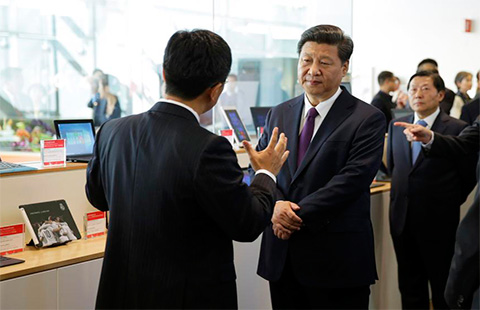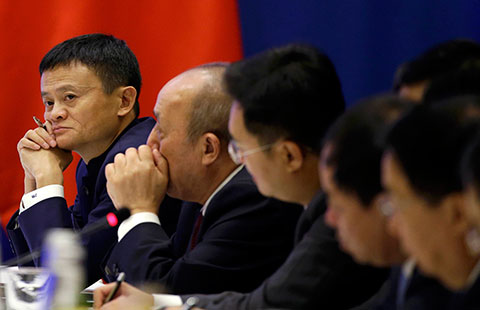Ethnic equality, unity and development in Xinjiang
Updated: 2015-09-25 06:33
(China Daily)
|
||||||||
VIII. Promoting the Unique Role of the Xinjiang Production and Construction Corps
Founded in October 1954, the Xinjiang Production and Construction Corps (XPCC) plays a key role in Xinjiang Uygur Autonomous Region. It assumes the responsibilities of reclaiming the wasteland and guarding the border areas commissioned by the state, and operates a unique administrative system that combines the functions of the Party, government, military and enterprise, with economic planning directly supervised by the state. It is an organization that handles its own administrative and judicial affairs within the reclamation areas under its jurisdiction in accordance with the laws and regulations and those enacted by the Xinjiang Uygur Autonomous Region. By the end of 2014, the XPCC had had under it 14 divisions comprised of 176 regiments, and was exercising jurisdiction over an area of 70,600 sq km boasting a total population of 2,732,900, accounting for 11.8 percent of Xinjiang's total.
Inspired by the XPCC spirit of "loving the motherland, selfless devotion, hard work, and forging ahead with pioneering endeavors," over the past six decades the XPCC workers have, generation after generation, made strenuous efforts to turn the desolate Gobi wilderness from time immemorial into ecological oases, initiate Xinjiang's cause of modernization, build one after another large farms and industrial and mining enterprises, and establish quite a number of new cities and towns. The XPCC has made an indelible contribution to the development of Xinjiang by promoting unity among all the ethnic groups, maintaining social stability and consolidating border defenses.
The XPCC has played an important driving role for the development and progress of Xinjiang. Starting with establishing farms by reclaiming wastelands, the XPCC expanded its activities to running mines, building factories and roads, developing commerce and trade, and initiating undertakings in science, education, culture and healthcare with funds for construction and life it had accumulated by way of working hard and practicing economy. Its regimental agricultural and stock raising farms and subordinating enterprises not only have provided for their own needs, but also have paid taxes to the local governments in accordance with the law, in addition to planning and building in succession quite a number of transport and hydropower projects as well as industrial and mining enterprises for the local governments, for free. To support Xinjiang' s industrial development, the XPCC has also transferred to the local governments, at no cost, a number of large-scale industrial, construction, transport, and commercial enterprises it had developed, making an important contribution to the modernization of the region. Since its founding, the XPCC has built eight county-level cities of Alar, Tiemenguan, Tumushuke, Kekedala, Shuanghe, Wujiaqu, Shihezi and Beitun, six administrative towns of Jinyinchuan, Caohu, Wutong, Caijiahu, Beiquan and Shihezi, and a large number of smaller towns on the regimental farms, facilitating the urbanization process in Xinjiang.
The XPCC has played an exemplar role in guiding the development of productive forces in Xinjiang. Fully exploiting its large-scale and group advantages in production organization, the Corps has built a modern agricultural system featuring mechanized, intensive and massive-scale production which is unique to China's inland arid areas, leading the nation in agricultural water-saving irrigation, promotion of mechanized farming, and the building of modern agriculture demonstration bases; it has become a key national production base for quality cotton and specialty fruit. In 2014, the total sown area of farm crops under its management reached 1,327,900 ha, accounting for 22.2 percent of the total in Xinjiang. The total output of cotton was 1.6 million tons, making up 36.3 percent of Xinjiang's production and 26.6 percent of the national total, leading the country for years in per-unit yield, rate of mechanization and per-capita output. It also tops the country in both output and scale of production of water-saving irrigation equipment, tomato products and cotton textile spindles. Ninety-one items of its farm produce have been acknowledged as famous brands or reputed trademarks of China and Xinjiang.
The XPCC has promoted ethnic unity in Xinjiang. In Xinjiang, the divisions, regimental farms, enterprises and public institutions under the XPCC are extensively scattered in the various prefectures, cities, counties of Xinjiang, closely interwoven with the local administrative divisions and extensively involved in various aspects of the autonomous region's economic and social development. The Corps has earnestly implemented the Party' s ethnic and religious policies, performing public service and offering practical help to the people of various ethnic groups. As early as 1959, it formulated the Twenty-Article Outline Concerning Support to the Army and Love for the People for Sincerely Serving the People of Various Ethnic Groups. In 1984, shortly after it was restored, the XPCC launched a co-construction mechanism between its grassroots-level units and local villages. During their interactions, the Corps' agricultural production units have kept imparting new technology and new crop species to local farmers, helping all local ethnic minorities to gain prosperity. The Corps' medical institutions have kept making medical-aid tours to the local villages and pasturing areas all year round, delivering medicines, treating the sick and preventing diseases. The Corps' performing art troupes also bring free shows to the local peoples.
- Another corruption suspect repatriated from US to China
- Shanghai slaps three-year ban on entertainers caught doing drugs
- 37 students critical after botched fire drill in NW China
- Man writes Chinese calligraphy using kitchenware
- Brilliant Autumn Urumqi feasting many eyes
- Kids serve as traffic police in C China
- Colombia, FARC reach breakthrough agreement in Havana
- White House prepares for government shutdown
- EU leaders seek unity on refugee plans
- EU pushes through plan to relocate 120,000 refugees amid oppositions
- China, Malaysia conclude first joint military exercise
- Hillary Clinton opposes controversial oil pipeline

 Here's what's on the menu for the state dinner
Here's what's on the menu for the state dinner
 President Xi visits Microsoft campus in Seattle
President Xi visits Microsoft campus in Seattle-
 Xi revisits Lincoln High School after 1993 bond
Xi revisits Lincoln High School after 1993 bond 
 Chinese, US business leaders gather at roundtable meeting
Chinese, US business leaders gather at roundtable meeting-
 Xi visits assembly line of plane manufacturer Boeing in US
Xi visits assembly line of plane manufacturer Boeing in US -
 First Lady tours Fred Hutchson Cancer Research Center
First Lady tours Fred Hutchson Cancer Research Center 
 Boeing to sell 300 planes to China
Boeing to sell 300 planes to China-
 Sino-US ties need more understanding: Xi
Sino-US ties need more understanding: Xi
Most Viewed
Editor's Picks

|

|

|

|

|

|
Today's Top News
Young people from US look forward to Xi's state visit: Survey
US to accept more refugees than planned
Li calls on State-owned firms to tap more global markets
Apple's iOS App Store suffers first major attack
Japan enacts new security laws to overturn postwar pacifism
Court catalogs schools' violent crimes
'Beauty of Beijing's alleys akin to a wise, old person'
China makes progress fighting domestic, international cyber crime
US Weekly

|

|







